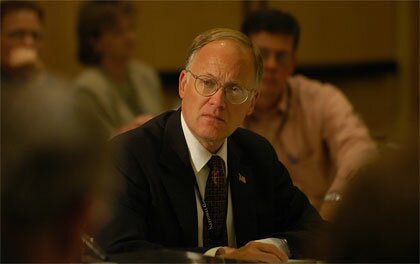A short break from the cheeky political analysis and irony, for one highly serious post. As many of you know by now, I filed Monday with the Secretary of State’s office to campaign for the State Senate from Chittenden County. The Bank and Treasurer Designation form indicates that I’ve begun campaigning already, in fact, begun raising and spending funds, begun speaking with people around the County about the campaign and about what sort of message they want to send to Montpelier. Begun a whole new life, really.

In short, the form puts into practice what I’ve always argued for on a daily basis here at VDB: political candidates who are certain that they want to run should go ahead and do so, as early and as passionately as possible. No equivocating, no trial-ballooning.
In my own case, I’ve taken a leave of absence from Vermont Public Radio, and won’t be doing either Vermont This Week or WKVT “Live and Local” for the duration.
And the duration is a good long while.
At this point the 2010 general election is about seventeen months away. That’s time enough for two babies, if one is the fairly impatient sort. But it will take every minute of that seventeen months to reach all the voters in all the districts in all the cities and towns and gores that will finally decide the race. If I thought I could run and win in sixteen months, or ten, I’d gladly have done so. But there it is.
With the exception of a full-blown statewide race, a run for the State Senate from Chittenden County is the most difficult in Vermont, bar none. To make it worse, I’m not a wealthy man, and my friends and acquaintances tend to be no better off financially. Both my parents were only children. So I have no aunts or uncles or cousins. Shallow pockets and a small (yet wonderful) family — not your standard recipe for electoral success, especially in this race.
But I have some advantages. First, writing political commentary for Vermont Public Radio for the last eleven years — and writing at this site every single day for the last four — has taught me what I believe.
And it’s helped me hone those beliefs into shorter, sharper points, which never hurts.

Ines, who designed VDB, put together a word cloud representing the terms most frequently used on the site
Second, talking electronically with you all about the issues every day, both on the blog and via email, has opened me up to ways of thinking I wouldn’t have expected, and issues I wouldn’t necessarily have considered my own. Working with Steve West in Brattleboro taught me, for instance, that Vermont Yankee is not a Windham County issue or a Bennington County issue but a very pressing issue statewide.
I got religion on that issue, and it became a passionate concern for me. And I’m proud to say that this site was one of the first outlets in the state, either traditional print or digital media, to publish the now-infamous photos of the water tower collapse in 2006.
Talking every week with advocates for wind allowed me to see how aggressively Governor Douglas was closing the door to renewables like wind, even as he was backstopping Entergy’s efforts to evade its clear corporate responsibilities.
I learned from you, that is, how the issues interconnect, and why they can’t wait.
Third, we live in a very special technological moment. If you’re a regular reader of this site, you know I worked nonstop to elect Barack Obama; I was part of the original planning group for Vermonters for Obama, and went to Denver as a delegate to do my own small part to make sure nothing prevented him from accepting the nomination.

Democratic National Convention, Denver 2008: Vermont Obama Delegation [Photo: Carolyn Dwyer]
And the most amazing thing about the Obama campaign was not Barack Obama himself, impressive as he is: it was the way that small donors took the nomination out of the hands of super-delegates, and delivered it personally — without party intervention — to the candidate of their choice.
And armed with that support, Obama managed the politically impossible.
I’ll be honest with you. My hopes for my own campaign rest with small donors too. And if you’re reading this, at your own computer — and particularly if VDB is one daily stop on your bookmark list — I had you specifically in mind when I filed on Monday. My thought was that if 25% of the people who’ve come to like this site over the years would send a small donation early in the process, as early as now, I could launch a very serious campaign.
One in four of you out there.

Again, if you are a regular reader, you know that I’ve never used advertising of any sort, because I wanted to maintain a clean reading experience for those who clicked in. I’ve never asked for donations, or subscriptions. I’ve never asked readers for anything, in fact, except for a vote in the Daysies each year, a nod in the Best Political Blog category. Even that I’ll be forgoing this year.
When the time comes, I’ll ask you instead to consider voting for Green Mountain Daily in the Best Political Blog category, and Bill Simmon’s Candleblog in the Best Non-Political Blog slot. They do what they do with real skill and flair.
But I will ask you now to donate to this campaign, straight out. This is a race that can’t be won without donations, and part of the reasoning behind a long campaign was to allow me to raise what’s necessary. As things go forward, I’ll be talking more about the specific issues and framing up my candidacy, trying to convince voters to take a chance.
But again, if you’re a regular reader here you already know exactly how I see the world, my take on just about every issue large and small.
You know how I’d respond to the issues, and to constituent concerns, because if you’ve ever emailed me through this site, I’ve emailed you back, pretty promptly, and we’ve had a conversation. And even if we’ve disagreed, chances are good we found a way to agree on something.
Eventually we’ll have an Act Blue page up and running, and you’ll be able to donate with your credit card. And God love you in advance if you eventually do so. But what I’m asking for now is the very earliest help: early-early, ground-floor, raise-high-the-roofbeams sort of help.

We’ve set up an old-school post office box in Burlington, and if you still know how to use snail mail, and want to donate at some point, I’ll ask you to consider doing it now. Anyone will tell you that early money is especially crucial, and I can promise you I’ll never forget the help.
It’s so early that no campaign stationery exists as of yet, although at some point we’ll get some printed with a classy logo at the top. But for now, you’ll get a plainer, simpler thank-you in the mail, making clear how much I appreciate not only your support in this race, but your support as a reader in the grand digital scheme of things, over the last four years, and as a listener for the last decade.
More soon.

 To call it what it is, the bill at issue (H.436) was a very mild piece of legislation — not exactly toothless, but with all the incisors filed purposefully flat, in an attempt to moot the Governor’s veto. It called for Entergy to assemble a potential line of credit, to be activated only in the event that decommissioning began in 2012, still an unlikely scenario at this writing.
To call it what it is, the bill at issue (H.436) was a very mild piece of legislation — not exactly toothless, but with all the incisors filed purposefully flat, in an attempt to moot the Governor’s veto. It called for Entergy to assemble a potential line of credit, to be activated only in the event that decommissioning began in 2012, still an unlikely scenario at this writing.






 His tragic flaw? Affection and awe for Donald Henry Rumsfeld.
His tragic flaw? Affection and awe for Donald Henry Rumsfeld.



